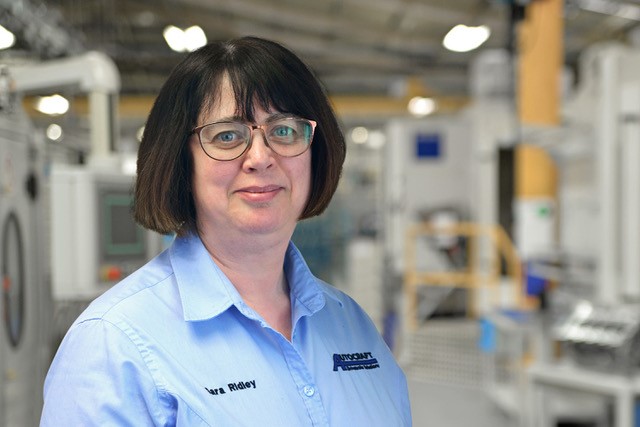How I was able to complete my PhD, progress my career in manufacturing, and raise a young family, by Dr Sara Ridley, project director, Autocraft Solutions Group 
In science, engineering, and manufacturing, diversity is not a given, even as universities and companies all take a positive stance. Women in these disciplines, both early in their careers and in leadership positions, should strive to change the image of engineering and inspire girls to become the engineers of the future.
The theme for the 2021 International Women’s Day was “Choose to Challenge”. I have sought out opportunities in my career to do exactly that. Since completing the course to become a STEM Ambassador, I have regularly volunteered at local schools and universities, running after-school activities and presenting at events for girls aged 8 to 16 that aim to change perceptions about engineering. I hope to impress on them that, rather than being about ‘spanners and dirty overalls’, STEM careers open doors. It’s an enormous field with many different and exciting possibilities, with most trajectories including frequent international travel and collaboration with diverse groups of people.
My connection to this cause started early in my career. I encountered Women in Science and Engineering (WISE) in 1984 when it was established and was inspired to pursue a career in this field. As women in my family did not typically go to university, I started work later that year, at the age of sixteen, through an apprenticeship in manufacturing.
After a decade in the industry, I crossed paths with researchers from the University of Strathclyde, who were gathering industry data for their research. I was happy to assist them, of course, but noticed that the industrial perspective was missing from their approach. When they ran the resulting research papers by me, I was able to provide some key insights.
This brush with academia proved infectious and convinced me to pursue a PhD, but I worried that I would not have enough time to make it happen, as I would have to balance it with rearing my family and supporting it financially. At this point in my thirties and raising four young boys, I recognised the only feasible way to conduct research would be to do so during working hours. The team at Strathclyde told me about the Royal Commission for the Exhibition of 1851 Industrial Fellowship: that it would allow me to complete a PhD while staying at my job.
The Commission works with partnering companies to fund Fellows’ salaries throughout their PhDs, giving companies the flexibility to allow Fellows to collect data and work on their research while on the job. My company was very supportive, making clear ‘you won’t be penalised for this, in fact we support it.’ They recognised that one person having both academic and industrial expertise would benefit the company in the long term.
First set up by Prince Albert on the heels of the Great Exhibition, the Royal Commission awards around 35 postgraduate Fellowships and Scholarships every year for research in science, engineering, and design, with the goal of extending the influence of science and art on productive industry.
I recognised that, like WISE, the Commission uses these opportunities to augment diversity in STEM, across both academia and in industry. I have stayed in touch with the Commission, regularly attending the Commission’s events, featuring presentations from current Fellows and alumni. I am always astonished by the breadth of research topics, as well as the people. To have that exposure of young, successful women in STEM to a wider network is something to be celebrated. I have long believed in the maxim ‘if you can see it, you can be it’, and I look forward to seeing the next generation of female scientists and engineers inspired by the research being done today.
In hindsight, it is also easy to recognise the benefits of the Fellowship on my own career. The emphasis on the industrial perspective made my academic research stand out, allowing me to travel to Japan and present at a major remanufacturing conference. I also won a Rematec Award.
The topics I explored in my research during the Fellowship are still applicable to today’s manufacturing processes. Even though my career has progressed a lot since that time, I keep up to date on the latest academic developments and trends, and continue to find value in having one foot in both camps.
Autocraft Solutions Group agrees. My work here has convinced them that the Fellowships are worthwhile, and they have since supported and encouraged another employee to gain an Industrial Fellowship.
Now at a later stage in my career and able to influence company culture from a leadership position, I have continued to strive for greater gender diversity because I believe that a diverse team is a strong team. We have consistently used gender-neutral language in our job advertisements and position diversity as one of our strengths at conferences and job fairs. These efforts have led to tangible results and today I am fortunate to work with some incredibly bright young women. Further progress is needed in our industry, though, especially around increasing flexibility. Home-schooling during the pandemic has emphasised this challenge and, while in-person collaboration will always be a cornerstone of manufacturing, we must continue to find new, flexible processes. As more women reach senior positions, I am confident we will see further positive change.

